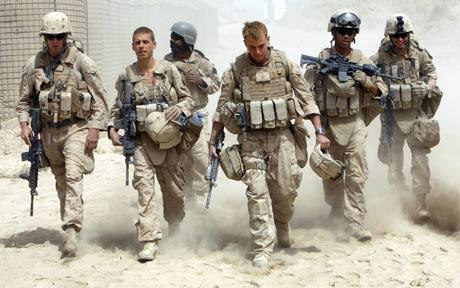This week in war

A top lobbying group for the arms industry has announced its intentions to lobby the new Congressional Supercommittee against defense spending cuts. According to the Aerospace Industries Association, the Pentagon's budget has already been “cut to the bone.” Supercommittee member Sen. Jon Kyl (R-AZ) isn't waiting for the military-industrial-complex's pitch. Kyl has started his own internal protest, demanding that no one on the committee ever mention military spending reduction. He even is threatening to resign if any such cuts are proposed.
Currently, US defense spending represents the largest military budget the world has ever seen and is only expected to grow with the expansion of a U.S. military presence in Africa. In the last week alone, Washington DC has spent close to $3.3 'B'illion dollars on operations in Iraq and Afghanistan.
Weary about the potential for a similar financial commitment to Libya, NATO's top military brass are opposed to long-term intervention in North Africa and are eager to end the war in Libya, a senior military officer told the Associated Press on condition of anonymity.
“We must end this Libyan business quickly,” the NATO official said. “We just cannot afford this proliferation of missions which just drag on and on. One needs to finally end.”
The top levels of America's trans-Atlantic military alliance are apparently in agreement (even NATO Secretary-General and pro-interventionist Anders Fogh Rasmussen) that the prospect of nation building in Libya is an unacceptable one. Not only is the NATO war-machine increasingly at risk of budget cuts in light of the fiscal insolvency of its parent governments, officials are assured that trying to get Europeans to support a Libyan reconstruction mission after a decade-plus commitment to similar and ongoing endeavors in the Balkans and the Middle East will be an impossible task. Rasmussen is supporting the call for a United Nations peacekeeping force to take over NATO's role in Libya now that Gadhafi has been overthrown.
By contrast, American military officials are constantly reaffirming their willingness to play the role of nation builder. The latest example came this week when Army Gen. Carter Ham, commander of U.S. Africa Command, requested more special operations forces in order to fight “terrorism” and build more pro-American militaries on the African continent. Ham told reporters in Washington on Wednesday that he would like more special ops forces now, but he said he expects to get his wish in the coming years as troop levels wane in Afghanistan. Ham is one of several top military officials who are warning Congress not to cut the budgets of special ops forces. To do so would threaten national security, they say.
In 2007, the US increased its military presence in Africa much to the chagrin of critics who accused the Executive branch of positioning itself to set up permanent US bases there. Ham's request and his assessment of Camp Lemonier in Djibouti as a “very, very interesting and important hub” that requires expansion, only work to further support such a theory.
According to Ham, African leaders are widely supportive of U.S. militarization in their countries:
“We keep getting asked to do more and more and more, and go to more places,” said Ham. “More exercises, more military-to-military engagement, more and more requests for interchanges, and I don’t recall anybody saying, ‘We don’t want you to come here anymore.'”
In the Middle East, Syrian activists are claiming that government troops have killed a number of people in attacks on villages close to the Turkish border. At least 10 towns have been invaded in the far north of the country, with lines of communication completely severed from the region. The influx of refugees into Turkey from Syria's northern border has prompted the former to demand an end to crackdowns on protestors by the Assad government. The situation has deteriorated enough to have some Turkish officials contemplating an invasion of northern Syria to establish a “buffer zone” to shield Turks from the tumult. This latest offensive might be an attempt by Syria to test Turkey's resolve.
Elsewhere, Yemenis rallied by the thousands in the eastern province of Hudeidah on Wednesday to protest the Saleh government's practice of “collective punishment” against areas of the country that have reformed their local leadership away from regime control. Protesters accuse President Ali Abdullah Saleh of cutting off electricity supplies to populations who have demanded his ousting for the past seven months. In another sign that Yemen is teetering on the brink of collapse, a massive anti-government protest also took place on Wednesday in Taiz, Yemen's second-largest city. Some commentators are calling the Taiz rally a “flashpoint” for an uprising that will undoubtedly take down Saleh.
Finally, the cost for the Afghanistan and Iraq Wars crossed the $1.25 trillion mark. And according to icasualties.org, 6,244 US soldiers have died, and over 45,000 US soldiers have been wounded so far in the two war theaters.




